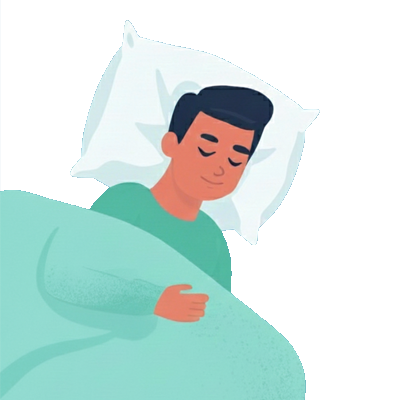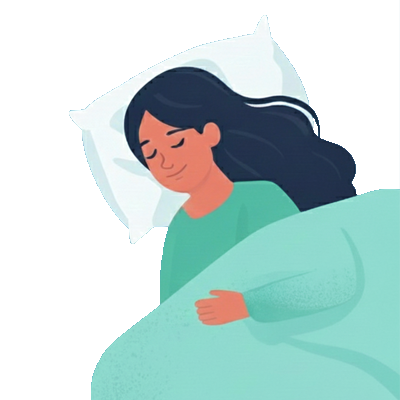You might think snoring is harmless, but sometimes, it’s a sign of something much more dangerous. Sleep apnea and heart attack are not just related; they’re deeply connected in a way that can silently threaten your health. Additionally, Sleep apnea is more than just noisy sleep. It’s a serious medical condition that affects your breathing, your brain, and most dangerously, your heart.
Furthermore, while many people ignore the signs, untreated sleep apnea quietly puts your life at risk. In fact, research has clearly shown a strong link between sleep apnea and heart disease, as the condition can significantly increase the risk of heart attacks and strokes, often without you even knowing it.
In this blog, we’ll explain exactly what sleep apnea does to your body at night, what is the link between sleep apnea and heart attack, how it harms your heart and brain, and what you can do to protect yourself.
Key Takeaways:
- Sleep apnea is a serious condition that increases the risk of heart attacks and stroke.
- Low oxygen levels during sleep put constant stress on the heart and brain.
- Untreated sleep apnea can lead to high blood pressure, irregular heartbeat, and blood clots.
- Warning signs include loud snoring, morning headaches, and daytime fatigue.
- Treatment options like CPAP therapy or oral appliances can help restore normal breathing during sleep.
What Is Sleep Apnea Doing to Your Body While You Sleep?
Sleep apnea occurs when your breathing is interrupted repeatedly throughout the night. These interruptions in breathing can last for several seconds and may occur dozens or even hundreds of times a night. Moreover, every time your breathing stops, the oxygen level in your blood drops. This drop in oxygen level puts your body under stress. Your brain reacts by waking you up briefly to resume normal breathing.
Furthermore, these frequent interruptions prevent your body from reaching deep, restful sleep. You may spend hours in bed, but you still wake up feeling tired the next morning. Beyond just poor sleep, these breathing pauses put a strain on your body. Over time, this ongoing stress raises your blood pressure, disrupts your cardiac rhythm, and increases the risk of damage to both your brain and heart.
Moreover, sleep apnea causes inflammation throughout the body. These inflammations cause the blood vessels to get stiff and narrow. As a result, the risk of cardiovascular disease and stroke becomes higher.
How Sleep Apnea Strains Your Heart: A Hidden Threat
Ever thought about what happens to your heart while you sleep? And how does sleep apnea affect the heart?
Sleep apnea disrupts breathing throughout the night, causing oxygen levels in your body to drop. As a result, your body doesn’t get enough oxygen. Additionally, this shortage forces your heart to pump faster to meet the body’s needs. Additionally, this extra effort puts a continuous strain on your heart. Over time, it can raise your blood pressure and lead to irregular heartbeats.
Furthermore, low oxygen levels also trigger the body’s fight-or-flight mode. This is the natural stress response, where stress hormones like adrenaline are released. These hormones speed up your heartbeat and put extra stress on your heart and blood vessels.
- High blood pressure can become permanent.
- The walls of the heart become thick.
- The risk of heart failure increases.
- The chances of cardiac attack and stroke increase significantly.
This means that sleep apnea effects on heart can be severe. If ignored, the hidden dangers of sleep apnea can quietly damage your heart health, often without any warning. Moreover, constant stress can harm your arteries and lead to dangerous plaque buildup. If this plaque blocks blood flow to your heart or brain, it can trigger a heart attack or stroke.
Looking for a Comfortable Way to Manage Sleep Apnea?
Discover custom oral appliances designed to treat sleep apnea comfortably and effectively.




Sleep Apnea and Heart Attack
What is the Dangerous Link Between Them?
Sleep apnea and heart attack are closely connected. Each time your oxygen drops during the night, your heart muscles suffer. Over time, this damages the heart’s structure. Additionally, obstructive sleep apnea also increases the risk of atrial fibrillation, where the heartbeat becomes irregular. It’s a leading contributor to heart attack risk.
Moreover, when your body lives in a constant state of oxygen shortage and stress, your blood vessels lose their flexibility. Consequently, they become stiff and narrow. This makes it easier for blockages to form and harder for your heart to function properly.
Studies show that untreated sleep apnea increases your risk of a heart attack by more than 30%. That’s serious danger, and it underscores why awareness of sleep apnea and heart attack connection is so important.
Can Sleep Apnea Cause Stroke?
Many people wonder, “Can sleep apnea cause a stroke?” The answer is yes, and scientific research backs it up.
Sleep apnea reduces the oxygen supply to the brain, just like it does to the heart. Because the brain is extremely sensitive to low oxygen levels, this can lead to real, long-term damage.
Furthermore, repeated stress on your blood vessels increases the chance of clot formation. If a clot blocks a blood vessel in your brain, the result is a stroke.
Here’s how sleep apnea and stroke are connected:
- Low oxygen causes brain cell damage.
- High blood pressure increases the chances of bleeding in the brain.
- Irregular heart rhythms cause clots to form.
- Inflammation weakens the walls of the brain arteries.
Additionally, sleep apnea may cause silent strokes that don’t show clear symptoms but still damage brain tissue over time. These silent strokes add up and can lead to memory loss or even dementia.
Warning Signs You Shouldn’t Ignore
Sleep apnea often gets overlooked. But there are warning signs you can look for, both during the night and during the day.
Watch for these nighttime signs:
- Loud, frequent snoring.
- Gasping for air during sleep.
- Long pauses in breathing (noticed by others).
- Restless tossing and turning.
Daytime signs may include:
- Morning headaches.
- Waking up exhausted, even after 7–8 hours of sleep.
- Trouble focusing or remembering things.
- Mood swings or irritability.
Moreover, if you have high blood pressure that’s hard to control or experience frequent irregular heartbeats, sleep apnea could be the hidden cause.
Protecting Your Heart and Brain: What You Can Do
Although experiencing sleep apnea can be an exhausting struggle, the good news is that sleep apnea is treatable. Additionally, by treating it, you can lower your risk of both heart attacks and strokes.
Here are some important steps to take:
- Get diagnosed. A sleep study (at home or in a lab) can confirm whether you have sleep apnea.
- Lose weight if needed. Excessive weight can exacerbate sleep apnea.
- Avoid alcohol and sedatives. These relax your airway muscles and can make breathing pauses more frequent.
- Sleep on your side. Lying on your back makes breathing harder for people with sleep apnea.
- Use oral appliances prescribed by your doctor. These custom-made devices reposition your jaw or tongue to keep your airway open during sleep.
Furthermore, regular follow-up with your doctor can help you manage both sleep apnea and related heart issues.
Conclusion
Untreated sleep apnea takes a serious toll on your health. It’s not just about snoring; it’s a dangerous condition that quietly damages your heart and brain. From high blood pressure to cardiac attacks and strokes, the risks are severe and could lead to life-threatening complications. However, the good news is that sleep apnea is manageable with timely diagnosis and lifestyle changes. Moreover, paying attention to early symptoms, undergoing a sleep study, and exploring treatment options like oral appliances or weight management can make a life-saving difference. Don’t ignore the signs; your heart and brain depend on a restful, oxygen-rich sleep.
Have Questions About Disturbed Sleep?
Don’t wait for the symptoms to get worse. Talk to your doctor, get tested, and take the steps toward better sleep and a healthier life.










